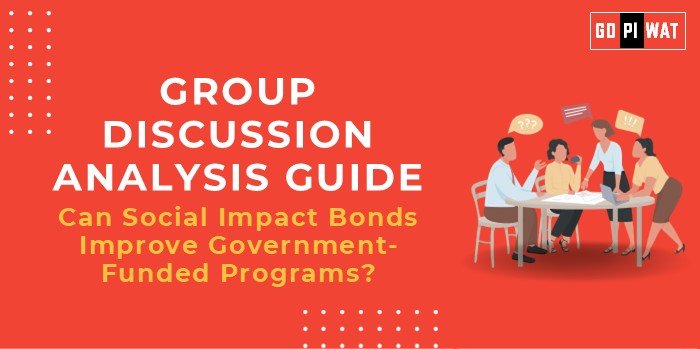📋 Group Discussion Analysis Guide
🌐 Topic: Can Social Impact Bonds Improve Government-Funded Programs?
🌟 Introduction to the Topic
Opening Context: Social Impact Bonds (SIBs) are a financial innovation aimed at improving outcomes in government programs by tying funding to measurable social impact. Their relevance is growing as public systems face increasing pressure to deliver better results with limited resources.
Topic Background: SIBs were introduced as a way to engage private investors in funding social programs. The first SIB was launched in the UK in 2010 to address recidivism. Governments repay investors only if specific outcomes are achieved, shifting the focus from inputs to results.
📊 Quick Facts and Key Statistics
- 🌍 Global Adoption: Over 200 SIBs across 35 countries have mobilized more than $500 million (OECD, 2023).
- 🇺🇸 US Programs: New York’s Rikers Island SIB reduced recidivism by 9%.
- 🇮🇳 India Example: Rajasthan’s SIB improved education outcomes in 2021 with over 75,000 students impacted.
- 📈 Success Rate: Approximately 70% of SIBs have met or exceeded their targets.
👥 Stakeholders and Their Roles
- Government Agencies: Define desired outcomes and manage contracts.
- Private Investors: Provide upfront funding in return for potential returns.
- Service Providers: Deliver interventions to achieve agreed results.
- Independent Evaluators: Assess performance and validate outcomes.
🏆 Achievements and Challenges
✨ Achievements
- Outcome-Oriented Programs: Focus on measurable results improves accountability.
- Resource Efficiency: Rajasthan’s education SIB achieved 20% better outcomes using the same budget.
- Public-Private Collaboration: Promotes innovation through diversified partnerships.
⚠️ Challenges
- Measurement Complexity: Defining and tracking outcomes is resource-intensive.
- High Transaction Costs: Developing and managing SIBs can be expensive.
- Limited Scalability: SIBs often target small, specific issues.
🌍 Global Comparisons and Case Studies
- 🇪🇪 Estonia: Used SIBs to address youth unemployment with measurable success.
- 🇬🇧 Peterborough Prison, UK: First SIB reduced reoffending by 8%, saving the UK government £8 million.
- 🇮🇳 Rajasthan, India: Improved student performance by integrating private funding and innovative teaching techniques.
🗂️ Structured Arguments for Discussion
- Supporting Stance: “SIBs improve efficiency by aligning government objectives with measurable outcomes, as seen in Rajasthan’s education sector.”
- Opposing Stance: “High transaction costs and scalability issues make SIBs less viable for broader systemic reforms.”
- Balanced Perspective: “SIBs provide innovative financing for targeted problems, but their scalability and cost-efficiency need refinement.”
🚀 Effective Discussion Approaches
- Opening Approaches:
- “Over 200 projects have achieved measurable outcomes globally.”
- “Peterborough Prison’s success highlights the potential for SIBs in tackling systemic issues.”
- Counter-Argument Handling:
- Point out limitations (e.g., high costs) and propose solutions like reducing administrative overhead.
🔍 Strategic Analysis of Strengths and Weaknesses
- Strengths: Outcome-driven funding, innovation, public-private synergy.
- Weaknesses: Complex setup, high initial costs, scalability limits.
- Opportunities: Broader application in healthcare, education, and sustainability.
- Threats: Unpredictable returns for investors, political shifts.
📘 Connecting with B-School Applications
- Real-World Applications: Could inform projects in public policy and impact investing.
- Sample Interview Questions:
- “How can SIBs address inefficiencies in government programs?”
- “What are the risks for private investors in SIBs?”
- Insights for Students:
- Understand public-private partnerships deeply.
- Explore how financial modeling can drive social outcomes.


